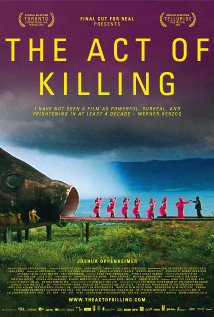Joshua Oppenheimer’s remarkable film, The Act of Killing will screen at Istanbul’s !f film festival for the final time on Sunday 24 February. The film focuses on Anwar Congo and his circle of friends who found themselves promoted from small time gangsters to death squad leaders following the military coup in in Indonesia in 1965, employed to eliminate alleged communists, ethnic Chinese and intellectuals.

When asked why he decided to make this film Oppenheimer talks about his desire to break the silence surrounding this dark chapter in Indonesia’s history and expose the war crimes committed by the death squads as a principle driving force. To do this however he conducts no interviews with torture victims or relatives and friends of those murdered. Rather Oppenheimer directs his camera on those who committed the atrocities. Anwar and his friends however agree to be in the film not to confess to a buried truth with the degree of grief and guilt one might expect. Instead the viewer quickly learns of the pride these men draw from their past.
This proud attitude with which Anwar and his friends and acquaintances recollect the acts of murder, torture and rape they committed is what pumps the dark heart of this film. But more terrifying still is how it exposes the process of cultural internalization of atrocities that occurs (and which is permitted and actively encouraged) when those who commit the crimes are on the winning side. The unashamed tone and narrative Anwar and his friends use to discuss the horrors of the elimination of “communists” and other enemies of the state is a narrative developed by the winners and consequently is used by society as a whole; chat show hosts, politicians, members of the public and newspaper editors alike all employ it and echo each other. In this way the film becomes a study of a past steeped in a violence which, rather than becoming a bloody stain on the country’s history, is shown to have instead become a proudly ingrained feature of Indonesian identity and culture.
The film does far more than just lift the lid on these atrocities however. In the final moments a duplicate of an earlier scene is shot. Anwar once again describes a method he devised for killing prisoners. In contrast to before however he doesn’t smile. He is more distracted and he retches violently as he explains the murder weapon. This scene amounts to a portrait of pain, both physical and mental, showing how the self-inflicted scars of acts of cruel inhumanity committed over time can never truly heal. Until now the film has largely avoided a traditional good vs evil template. It has shown us a pure and naked evil, existing in a vacuum and because of this remaining wholly unchallenged. Anwar’s deep-seated pain in this scene pierces that vacuum. It shows him as a man hollowed out and broken by a tremendous guilt. In doing so this scene serves, as Oppenheimer has it, as “the most powerful indictment of the regime.”
The final screening of The Act of Killing is at 15.30 at the Cinemaximum on Istiklal Caddesi on 24 February.
Image use intended as fair use.









